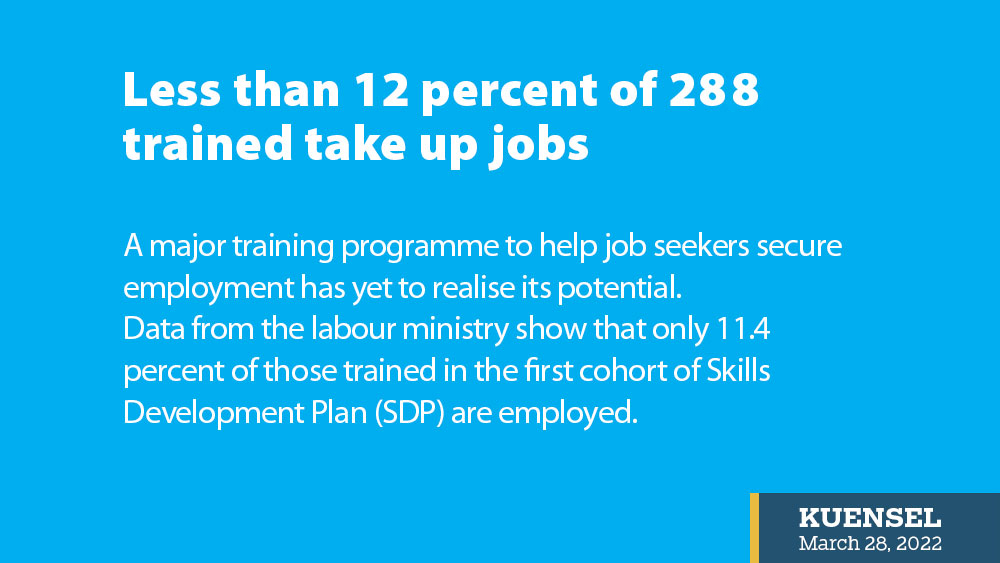… around 441 trainees are attending various skills development programme
Yangyel Lhaden
A major training programme to help job seekers secure employment has yet to realise its potential.
Data from the labour ministry show that only 11.4 percent of those trained in the first cohort of Skills Development Plan (SDP) are employed.
The first SDP course began on October 4 last year and 288 (male-185, female-103) completed training in 17 different skilling courses. Nineteen graduates of SDP are employed, 14 are self-employed and 36 have opted for up-skilling.
An official from the labour ministry said that 18 candidates trained with skills to work in early childhood care and education declined job offers from private firms. They preferred to work in government institutions and remained unemployed.
“Fifteen candidates trained in food and beverage skills are waiting to be placed after their selection interviews by employers were delayed by persistent lockdowns in Thimphu,” the official said.
SDP was initiated by the ministry upon Royal command to mitigate unemployment problems caused by the pandemic and to ensure inclusive and suitable recovery through effective interventions in skills training and professional development.
The programme targetted to train 5,000 jobseekers, laid-off employees and oversea returnees.
The labour ministry has identified 108 different courses in nine priority sectors; Agriculture, business and services, computing and information technology, construction, creative arts and design, electrical, electronic and mechanical, manufacturing, power and renewable energy, and tourism and hospitality.
Currently, there are 441 ( male- 265 and female-173) jobseekers and laid off people training in 18 courses. They are paid Nu 3,500 as a monthly stipend. The ministry announced 578 slots.
An official with the labour ministry said that due to lockdown the courses could not complete as scheduled while some courses were on hold since January 17. “An additional 38 courses with 1,007 slots are announced.”
She said that many of the courses could not be implemented due to pandemic.
The ministry has spent about Nu 35 million as of March 16.
As per records of the labour ministry, there are 19,435 registered job seekers between 2018 and November 30, 2021. Of that, 6,459 had not engaged in any kind of employment or training.
The labour ministry official said that the job portal was mostly popular amongst the younger labour force and it should be noted that some job seekers opt not to register on the job portal. “ Individuals wanting to avail different training and engagement programs offered by the ministry are required to register on the job portal.”
According to Labour Force Survey (LFS) 2020, the unemployment rate is five percent and the youth unemployment rate for the same period is 22.6 percent with an estimated number of 6,992 unemployed youth.
Skills Development Programme
A labour ministry official said that SDP’s main objective is to respond to challenges posed by the pandemic and to enhance the country’s economic resilience in the post-pandemic situation through skills development in the next two fiscal years.
She said that one of among many strategies is to enhance the resilience of the Bhutanese workforce through the provision of high-quality training tuned to the needs of the emerging economy. “ SDP also aims to address the immediate impact of the pandemic, promote rural economic development, and provide livelihood opportunities in the rural areas.”
SDP is implemented in six Technical Training Institutes (TTI) and two institutes of Zorig Chusum (IZC). The courses not offered by TTIs and IZCs are provided by other identified public institutions.
The ministry provided opportunities in certain courses which required less qualification or no qualification for youth job seekers and those laid off who did not meet the required qualification such as tailoring, weaving, mushroom production, vegetable production, and village skills development programme ( VSDP).
She said that there should be minimum of 15 aspiring candidates from the gewog to apply for the same skill training category. “VSDP intends to provide them with new skills of particular usefulness in secondary activities to supplement their household incomes.”
The courses available under VSDP are construction carpentry, stone masonry, brick masonry, furniture making, plumbing, house wiring, home appliance repair and maintenance, tailoring, air conditioner repair and maintenance and cane and basket weaving.


